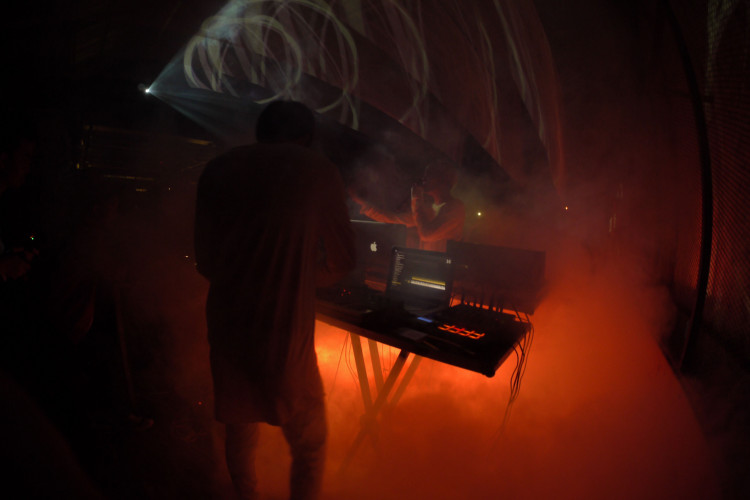










Indonesian creatives being appreciated overseas yet neglected in their own country is too often heard – an unfortunate but common circumstance even today. There are many Indonesian scientists, artists, cultural figures, etc, who have to deal with this attitude, many of them considered the best in their field world-wide yet not receiving such appreciation in their homeland. “Indonesia has a problem with talented eccentrics.” said Duncan Graham describing this odd habit in his article, “Hearing the Voice of God”, in the Jakarta Post
Slamet Abdul Sjukur, better known as SAS, is a literal example of this phenomenon. Born in Surabaya 79 years ago, SAS started his journey in music by studying piano privately from 1944-52, then studying at the Yogyakarta “Sekolah Musik Indonesia” from 1952 until 1956. Later, on a grant from the government of France, SAS studied music analysis with Olivier Messiaen and organology with Genevieve de Chambure at the Conservatoire National Superieur de Musique de Paris in 1962-63. He also studied chamber music with Victor Gentil, composition with Henri Dutilleux, counterpoint with Simone Ple-Caussade, harmony with Georges Dandelot, and Piano with Jules Gentil at the Exole Normale de Musique de Paris from 1962-67. Furthermore, he briefly studied with Pierre Schaeffer and his Groupe de Recherches Musicales in 1968.
Some of the awards he has received during his career are the Medaille de Bronze from the Festival de Jeux d’Automne in Dijon (1974), the Disque d’Or from the Academie Charles-Cros (1975, for a composition consisting of Angklung and vocals), and the Zoltan Kodaly Commemorative Medal in Hungary (1983). He was later named an Officier de l’Ordes des Arts et des Lettres by the government of France in 2000 and a life member of the Akademi jakarta in 2002. Through his body of work and accomplishment, Slamet Abdul Sjukur was dubbed to be the father of Indonesian Contemporary Music. Still, this is a name that only a few Indonesians know, and even the nickname doesn’t even begin to describe his contribution to Indonesian music.
Surprisingly, Slamet Abdul Sjukur embraces how Indonesians appreciate his works. “It’s normal, because here in Indonesia we are dealing with many kinds of music, and the fact that the music that I’m playing is not the kind of popular music that is being played on television is a big factor. So, if people here are not familiar with my work, it’s just fine to me” SAS explains. Nowadays, the composer lives in his modest house in the village area of Keputran, Surabaya, a neighborhood with alleways where children play chase, mothers gossip around the streets and the roaring sound from mosque’s megaphone can be heard clearly in every corner. He lives there peacefully and spending his day composing and teaching music.
“Teaching music is my way of making a living, because composing could not support me financially.” It is true that the music that Slamet plays is not popular in Indonesia. Especially in East Java where the most popular genre is rock music. “I initiated The Surabaya Music Association in 1957 before the existence rock music in Java. In the 1960’s we had almost 1300 members. We’ve never been in the spotlight, though, due to our lack of fanfare. Rock musician always had their own style, with their clothes and stuffs. And here we’re talking about the majority. There is a mistake in this majority concept, sometimes, in some certain point, the majority is filled with more bastards than the sane.”
There are many things in this life that’s just a matter of a coincidence. Including how Slamet Abdul Sjukur could finally enter into the world of music. Music first came to Slamet Abdul Sjukur when he was a kid. He was playing with his grandfather when suddenly his grandpa farted. The farts sounds funny, “twiiiwiwiwiiwiiit”, but instead of laughing at it, Little Slamet get carried away by it. “To me, my grandfather’s fart is music. Most people look music as a part of the culture-a result of human’s creation. If it came from non-human, then they don’t consider it as music. They define music as a matter of the human creation.
To me, music is not the matter of just human creativity, it’s how we perceive the sound of the universe, so that the sound of the universe has a deeper meaning than just a sound. To me, that’s what music is. Many people consider thunder and heavy rain as something that just passes by. For me, that kind of moment also is a music because of its pressure and accent. That’s music for people who really cares about music. No matter how people play a musical instrument, if it doesn’t connect with the listeners, then for me it’s not music at all”.
That kind of belief is manifested in Slamet Abdul Sjukur’s composition. In his stage, chamber, vocal, and multimedia works that have been published, it’s filled with unconventional harmonies from the combination of musical instrument and ambience of silence and natural voices. Silence has also become one of Slamet Abdul Sjukur’s signatures. In most of his work, silence becomes a major factor that helps to emphasize the atmosphere of the composition. This kind of character drives Slamet Abdul Sjukur to his achievements. All of his passions derived quirks makes it much more appreciated.
And that uncommon way of thinking can also be found through his music lessons. He has this unique way of teaching. In an interview with Jakarta Globe, he explained how he ask his students to compose one piece lasting 12 seconds and another running for 20 minutes. “I tell them they must feel the timing, be like a pickpocket,” he said. “They must create beauty in the shortest time. Music must touch the essentials. I tell my students to avoid notation. That can come later. Instead feel the emotion, the truth. That’s what’s important.”
After his studies in France, there were ongoing reforms in the implementation of the concept of music education, especially in terms of music composition. Previously, one must explore a wide range of musical fields before being able to make a piece of music, but for Slamet Abdul Sjukur’s students that kind of process is not a priority. He calls his methods of teaching as MINIMAX, to create a maximum result from minimal resources. In addition, his works often uses a mathematical approach where he uses methods like Kabbalah numerology system and Ferment spiral as his tools of making a great composition.
In the spirit of broadening his student’s knowledge, in 1981 he invited Ton de Leeuw, a Dutch composer, to give workshops, lectures, and concerts for a month in Jakarta’s Insitute of Art. As a result, music composing flourished in the art campuses. Now many the students from the various educational institutions are now involved in the field of education purely as composers, applying some of Slamet Abdul Sjukur quirky methods.
Despite the progress, Slamet Abdul Sjukur still feels the state of music education is far from ideal. “Here, music is an accompaniment, not its own piece of art. If a kid wanted to start learning guitar, his parents will always tell him not to let it be a distraction from his studies. Music here is a distraction. It’s really different in Hungary, where studying music is a must. Later countries such as Canada and Japan adopted this regulation. People here need to know that playing music will increase your intelligence.”











